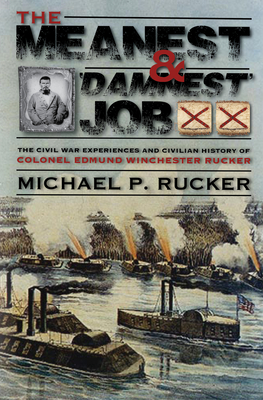The Meanest and 'Damnest' Job: Being the Civil War Exploits and Civilian Accomplishments of Colonel Edmund Winchester Rucker During and After the War

The Meanest and 'Damnest' Job: Being the Civil War Exploits and Civilian Accomplishments of Colonel Edmund Winchester Rucker During and After the War
Most Civil War histories focus on the performance of top-level generals. However, it was the individual officers below them who actually led the troops to enact the orders. Some of these were remarkably effective. One such officer was Edmund Winchester Rucker. He was a force to be reckoned with, both during the Civil War and in his post-war business ventures. He was courageous, tough and resourceful, and achieved significant results in every assignment. During the campaign by the United States Army to capture the upper Mississippi River, Rucker and his faithful Confederate artillerists, with only three operable cannons, held off the entire Federal fleet which possessed 105 heavy guns. Later, in East Tennessee, Rucker's duties included punishing saboteurs and conscripting unwilling local citizens into the Confederate Army. He described these assignments as: "The meanest and damnest [sic] duty a soldier had to perform." Following the battles for Chattanooga, he served with General Nathan Bedford Forrest as a cavalry brigade commander, earning high merits for his performance. Rucker's leadership was a major factor in the Confederate victory in the Battle of Brices Cross Roads, which has been called "History's Greatest Cavalry Battle." Subsequent to the Battle of Nashville, Rucker was wounded and captured; although his left arm was amputated, this did not impede his future achievements. After the war, Colonel Rucker and General Forrest became business partners in a railroad-building project. Rucker did well from this venture and became one of the wealthiest early entrepreneurs in Birmingham. In recognition of his many accomplishments, Fort Rucker Alabama was named in his honor. This first biography on his life examines, at a fast-moving pace, the military and business accomplishments of this outstanding leader who left his mark on both the Civil War and Southern industry of the time.
PRP: 285.09 Lei
Acesta este Prețul Recomandat de Producător. Prețul de vânzare al produsului este afișat mai jos.
256.58Lei
256.58Lei
285.09 LeiLivrare in 2-4 saptamani
Descrierea produsului
Most Civil War histories focus on the performance of top-level generals. However, it was the individual officers below them who actually led the troops to enact the orders. Some of these were remarkably effective. One such officer was Edmund Winchester Rucker. He was a force to be reckoned with, both during the Civil War and in his post-war business ventures. He was courageous, tough and resourceful, and achieved significant results in every assignment. During the campaign by the United States Army to capture the upper Mississippi River, Rucker and his faithful Confederate artillerists, with only three operable cannons, held off the entire Federal fleet which possessed 105 heavy guns. Later, in East Tennessee, Rucker's duties included punishing saboteurs and conscripting unwilling local citizens into the Confederate Army. He described these assignments as: "The meanest and damnest [sic] duty a soldier had to perform." Following the battles for Chattanooga, he served with General Nathan Bedford Forrest as a cavalry brigade commander, earning high merits for his performance. Rucker's leadership was a major factor in the Confederate victory in the Battle of Brices Cross Roads, which has been called "History's Greatest Cavalry Battle." Subsequent to the Battle of Nashville, Rucker was wounded and captured; although his left arm was amputated, this did not impede his future achievements. After the war, Colonel Rucker and General Forrest became business partners in a railroad-building project. Rucker did well from this venture and became one of the wealthiest early entrepreneurs in Birmingham. In recognition of his many accomplishments, Fort Rucker Alabama was named in his honor. This first biography on his life examines, at a fast-moving pace, the military and business accomplishments of this outstanding leader who left his mark on both the Civil War and Southern industry of the time.
Detaliile produsului











